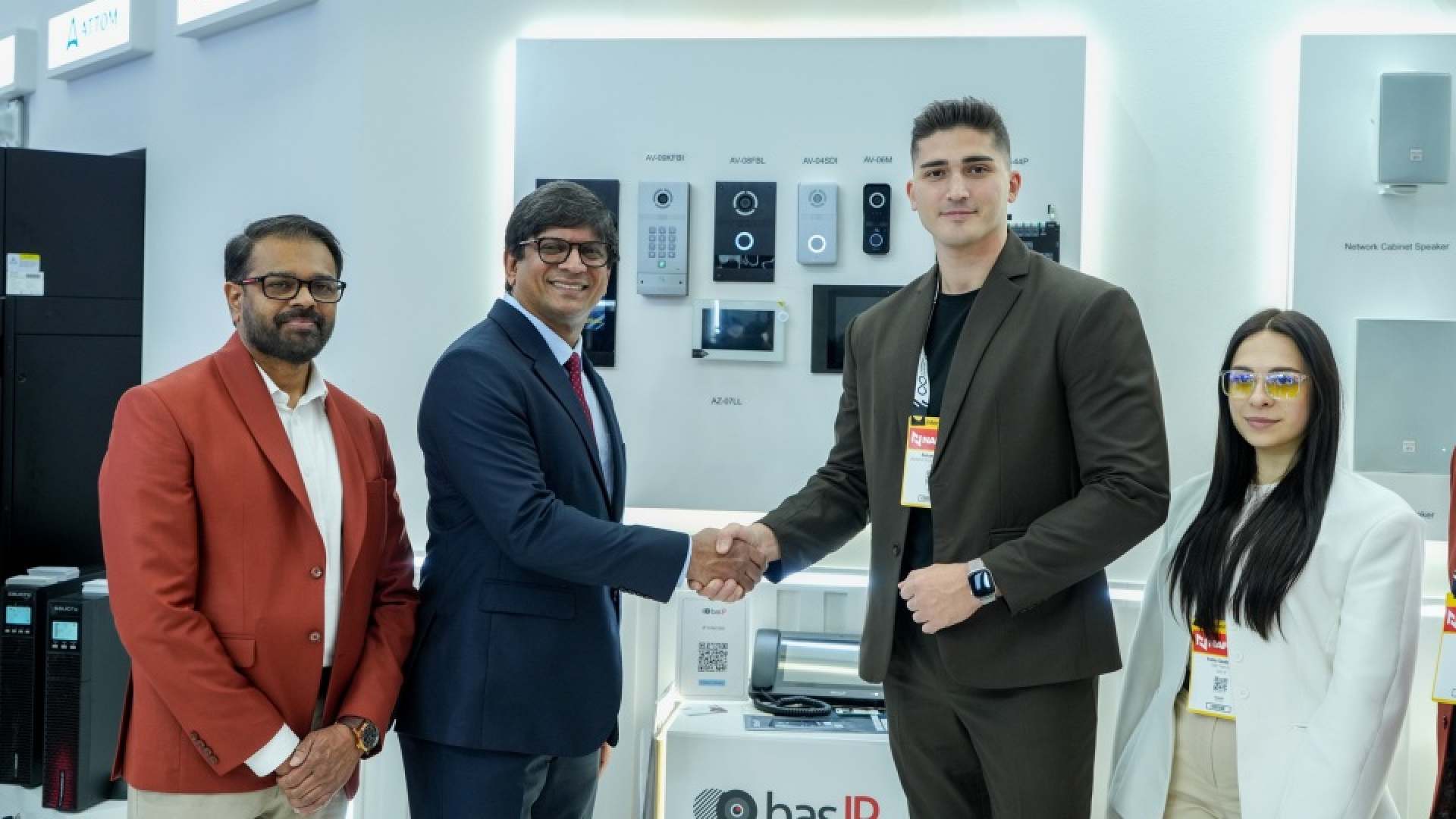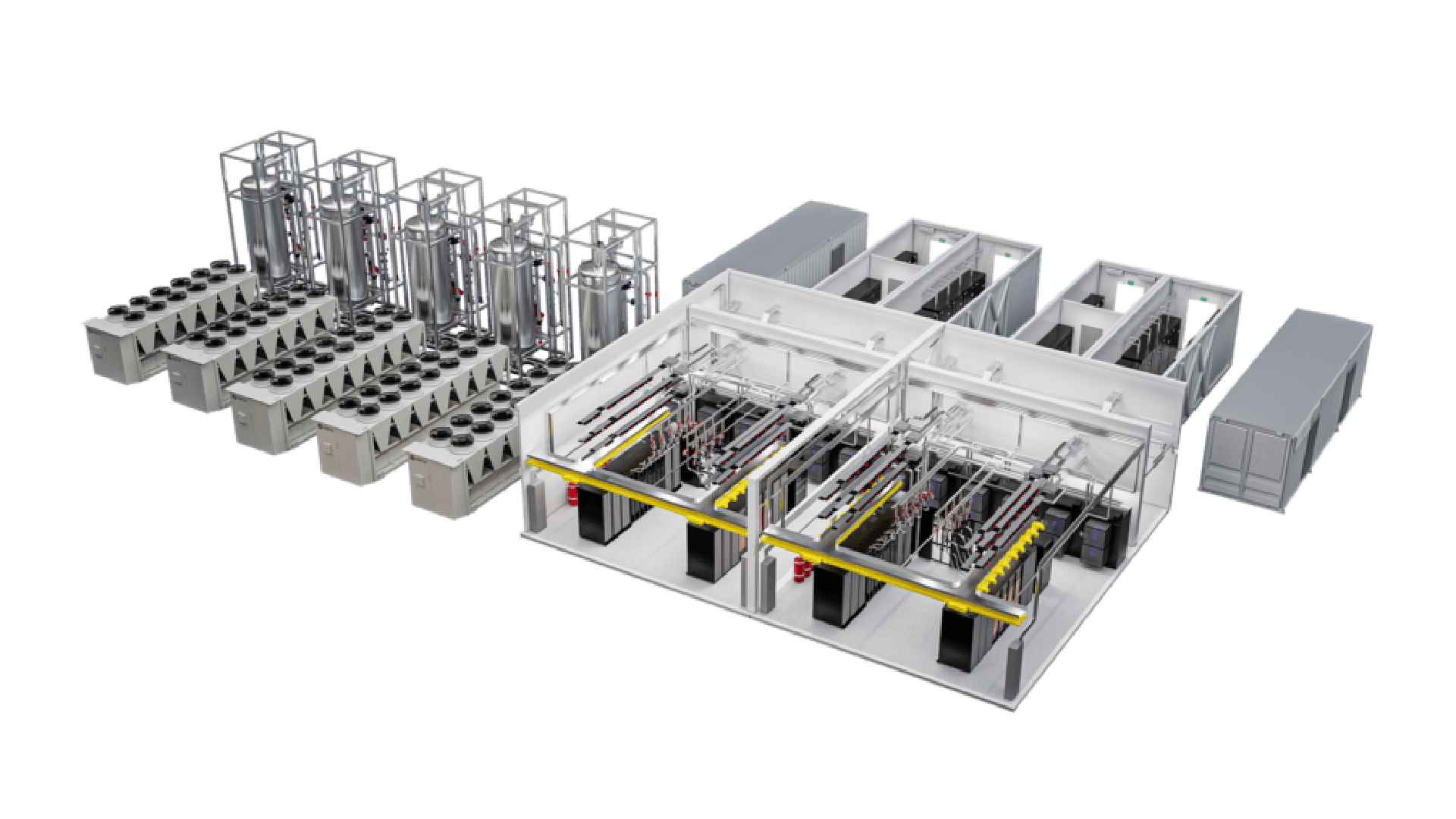Tech News
Ai Everything Global 2025: Insight-fuelled debates & thought-provoking discussions show AI’s divisive power on enthralling first day in UAE capital

After weeks of rising excitement across the international AI community, Ai Everything GLOBAL is officially underway in the UAE after a thrilling opening day kicked off the year’s largest public-private global AI gathering.
Organised by Dubai World Trade Centre (DWTC) and KAOUN International in affiliation with GITEX GLOBAL, Ai Everything Global is the world’s premier AI event. It welcomes the most influential AI stakeholders across Abu Dhabi and Dubai from February 4-6 – paving the way for participants to examine the technology’s global impact, propel cross-continental collaboration, and define new boundaries for AI innovation.
Live from the St. Regis Saadiyat Island Resort, the Ai Everything Summit headlined the Tuesday programme as a capacity crowd and action-packed agenda marked a sensational start to the AI industry’s 2025 international events and exhibitions calendar.
H.E. Faisal Al Bannai, Adviser to the UAE President & Secretary General of the Advanced Technology Research Council (ATRC), hailed the influence and impact of AI globally during an inspirational keynote speech. H.E. declared: “Every generation throughout human history likely said they lived during an interesting time; however, I believe we can truly say that we are living in a world where AI innovation is redefining and reshaping what’s possible like never before. The Age of Intelligence is just beginning – and there is still so much to transpire and achieve in terms of AI. The possibilities are increasingly immense with how fast the AI ecosystem is innovating and evolving – and open source is one of many aspects encouraging collaboration and empowering all to harness AI capabilities.”
H.E. Omar Sultan Al Olama, Minister of State for Artificial Intelligence, Digital Economy & Remote Work Applications, also emphasised AI’s vital role in the UAE’s future socio-economic development. He said: “We want to deploy things that benefit quality of life. If we want this technology to proliferate, if we want AI to be part of each and every one of our lives, we have to make sure it is also economic in terms of ability to access it, with a good economic value.”
It’s Ai in Everything: Diverse Perspectives Amidst Tectonic Market Shifts
Featuring distinguished government heads, technology directors, and Chief AI Officers alongside market-leading AI innovators, executives, and policymakers, the Ai Everything Summit staged an enthralling series of the most thought-provoking, insight-fuelled debates and discussions surrounding current AI dynamics and the industry’s future trajectory.
As a unifying platform for addressing pressing industry challenges and analysing the most incredible opportunities amidst deep structural market shifts, the Summit welcomed renowned visionaries from a wide variety of increasingly AI-critical industries. Alongside the energy, education, healthcare, finance, government, Industry 4.0, and creative economy sectors, Ai Everything Global cast a unique spotlight on AI’s rising influence across film, television, and digital entertainment.
Amongst the many major Day 1 highlights was an incredible interactive presentation by Jonathan Bronfman, the world-famous creator of Vanity AI tech used in Hollywood Blockbusters like ‘Spider-Man: No Way Home’ and Netflix’s record-breaking viewership series ‘Stranger Things’ and ‘Squid Game’. The Co-Founder of Canadian VFX studio Monsters Aliens Robots Zombies (MARZ) shared fascinating insights surrounding the movie industry’s AI-driven revolution during ‘The Death of Retakes: How AI is Rewriting Hollywood in Minutes’.
Bronfman spoke in glowing terms regarding AI’s future in film, insisting the industry will benefit tremendously from the technology’s revolutionary capabilities. He said: “Gen AI will impact Hollywood in a massive way. The spectacle traditionally seen in movies like Mission: Impossible, Star Trek, and Star Wars is expensive and time-consuming. GenAI will make film production and development more affordable which studios desperately need – while still attracting audiences to the big screen.”

Whilst advocating AI-Hollywood collaboration, Bronfman assured audiences that people will always be essential, despite rising concerns regarding AI displacing industry jobs: “A fully GenAI movie or series is not a threat to Hollywood. The human touch will never disappear because human creativity and intelligence are unmatched. If you look at YouTube influencers and the way they’re pulling eyeballs away from Hollywood already; consumption habits are changing massively. That’s the biggest threat facing the industry.”
From governance frameworks, commercialisation requirements, and cross-industry pivots to market-altering developments, first-hand projections, and the global AI leadership race, the summit was met with critical acclaim as attendees examined the radical winds of change reverberating across digital economies globally. With AI proving both unifying and divisive globally, audience members witnessed world-leading experts present a range of broad perspectives.
Amongst the many was a panel discussion titled ‘How is AGI Accelerating? Navigating the Growing Pressure to Fast-Track AI Innovation’. Stuart Russell, Professor of Computer Science at UC Berkeley, stressed an urgent necessity for stringent AI industry regulations, revealing: “This narrative that regulation stifles innovation is toxic – the record shows us that unregulated digital technologies can cause severe harm. We – as experts in AI – do not understand how this technology works. And when it doesn’t work, nobody has a way of fixing it. Nodody really knows what’s next. Whether making the next generation of large language models bigger will produce AGI is just speculation at the moment.”

Another standout session involved Kate Darling, Research Scientist at MIT Media Lab in the US. During an interactive presentation and robot demo, she shed light on groundbreaking research surrounding a future where robots and people work and co-exist in harmony: “Engineers have been working for decades to produce a robot that’s robust, reliable, and safe enough to roll out on the public street. For me personally, the most interesting thing isn’t necessarily the technical developments that we’ve seen. The really interesting thing is what happens when you take AI and robotics and put them together with people. Because as people start to encounter these technologies in their daily lives, we see some really interesting reactions.”
Examining the Winds of AI-Driven Change Globally
As the first AI-focused event following recent era-defining AI developments – from the $500 billion Stargate announcement to DeepSeek’s emergence and divisive debates at the 2025 World Economic Forum – Ai Everything Global provided the perfect platform to examine evolving global power dynamics.
Whilst fulfilling its critical touchpoint pledge for the technologically ambitious to broaden industry acumen, engage with AI leaders, and accelerate strategies through prolific public-private networking, a unique spotlight was cast on regional AI integration and deployment progression.
Stephen Burt shared positive insights when elaborating on whether affordable AI is the key to breaking a perceived big tech power concentration and driving innovation. The Government of Canada’s Chief Data Officer said: “We can get there, and we’ve actually done the basics in ensuring we have the core data in the right places alongside required infrastructure. Whether the big AI winners are in Silicon Valley, from the venture capital area, or elsewhere around the world, achieving desired results is possible because AI models are becoming so much more accessible.”
Ott Velsberg, the Estonian Government’s renowned Chief Data Officer who oversees data and AI governance in Europe’s top-rated country for digital public sector services, also revealed how countries globally could thrive following successful AI and data analytics utilisation: “A more proactive government is the way to go – actively collaborating with the private sector whilst educating the public sector. Over the last two years, data-intensive companies have grown their revenue by 60% on average, which amounts to €5.7 million daily. International collaboration has grown stronger than ever before – and different universities and countries are also pulling their resources together when faced with adversity.”
Next Up at Ai Everything Global 2025
After a defining first day in Abu Dhabi, the Ai Everything Global programme switches to another of the UAE’s rising AI capitals of the world as Dubai Exhibition Centre (DEC) hosts a highly anticipated Exhibition Showcase (5-6 February).
Live from Expo City, Wednesday and Thursday will highlight groundbreaking R&D use cases alongside the most transformative real-world applications covering governments, business, society, and core pillars of global economies.
Awaiting visitors is an exclusive first-hand discovery of the most patented and award-winning AI innovations from 70-plus countries, featuring a highly curated selection of over 500 exceptional pure AI companies and fastest-rising startups, with 70% marking their regional debut.
Among the many world-leading tech powerhouses exhibiting are ASUS, Alibaba Cloud, AWS, Dell, e&, Fortinet, G42, HP, and IBM. Others include Intel, Lenovo, Nokia, Oracle, Palo Alto Networks, Red Hat, Technology Innovation Institute (TII), and Zoom.
Tech News
AI and Data Roles Drive Gulf Hiring Growth: RemotePass report

Hiring growth in the UAE and Saudi Arabia remains among the strongest globally, at 39% and 26% respectively in 2024–25, but the expansion is increasingly concentrated in a narrower set of roles, according to the RemotePass 2025 Hiring Report.
Data from the report shows outsized growth in specialised roles, with Data Scientist hiring up 43% and AI Product Manager demand rising 37%. The concentration of growth in these functions indicates that organisations are directing hiring investment toward specific capabilities rather than expanding uniformly across all technology roles.
This pattern reflects a shift in regional workforce strategy, with employers increasingly directing resources toward roles that support data-driven decision-making, AI deployment, and product execution, rather than scaling traditional technology teams.
AI and Data Roles Redefine Hiring Priorities
The UAE leads globally in AI hiring growth, rising from 32% in 2023–24 to 48% in 2024–25. The acceleration is among the sharpest recorded in any market and is being fuelled by enterprise AI adoption, fintech automation and large-scale digital infrastructure projects. Saudi Arabia shows a similar direction of travel, though at a steadier pace, as AI talent demand expands across both public and private sectors.
RemotePass Co-founder and CEO Kamal Reggad, said the data shows organisations in the UAE and Saudi Arabia moving decisively from experimentation to execution. AI is no longer confined to innovation teams, he noted, but is increasingly embedded into core business functions, making workforce planning a critical lever of competitiveness.
MENA Talent Hubs Continue to Power the GCC
While demand is strongest in the Gulf, the wider MENA region remains central to meeting it. Egypt continues to lead hiring volume across nearly every major tech role, including software engineering, backend, frontend, data science and QA, confirming its position as the region’s largest tech talent exporter. Pakistan ranks second across several engineering categories, supported by a large and cost-effective developer base.
Egypt’s AI hiring growth, after surging by 112% in the previous year, has stabilised at 28% in 2025. In contrast, Gulf markets have accelerated, reinforcing a regional realignment in which the UAE and Saudi Arabia are emerging as the primary centres of advanced technology hiring, supported by a broader MENA talent ecosystem.
Tech News
GCC RESIDENTIAL SMART SECURITY MARKET SET TO ADVANCE AS SCREENCHECK PARTNERS WITH BAS-IP

ScreenCheck, a subsidiary of Centena Group and a key player offering end-to-end identification and security solutions in the Middle East, has signed a strategic partnership agreement with global security technologies company, BAS-IP to officially expand its security and identification capabilities into GCC’s residential security market.
The agreement signed during Intersec 2026, aligns with ScreenCheck’s ongoing efforts to establish a robust position in the rapidly growing smart security and digital transformation market. Currently, the market is projected to reach USD 907.12 billion by 2032, growing at a compound annual growth rate of 25.7 per cent between 2025 and 2032. This growth is mainly propelled by large-scale urban development, smart infrastructure investments and surging demand for connected security ecosystems in the residential sector.
Olga Shamilova, Chief Executive Officer at BAS-IP, said: “We are delighted to partner with ScreenCheck and support their entry into this new vertical of security systems. During our participation at Intersec 2026, we witnessed increased interest for our Open API, especially for its ability to create seamless, customised ecosystems and ease to integrate into existing building management systems. Our mobile-first application also received significant attention, as its intuitive interface was proven ideal for both complex multi-apartment projects and luxury private villas. With ScreenCheck’s market expertise in the region and their top tier client base, we look forward to providing a safe and secure environment for communities.”
The collaboration with BAS-IP will address the surging demand from developers for connected home and community security solutions across apartments, gated communities and large residential developments in the region by delivering integrated IP-based audio and video intercom systems combined with access control solutions.
Faisal Mohamed, CEO of ScreenCheck, said: “As cities continue to develop and digital infrastructure becomes an inevitable part of everyday lives, security is equally important for people and systems. We are delighted to work with BAS-IP to serve this evolving market.”
“With the Middle East region experiencing one of the fastest-growing property markets across the globe, our collaboration helps to distribute integrated residential security and home automation solutions. We will be delivering cutting-edge biometric identification, RFID solutions, AI-powered surveillance, and next-generation smart access control to homes, critical infrastructure, and technology-driven enterprises. Our goal is to enable safer, more resilient spaces that highlight the capabilities of the modern security landscape,” added Faisal.
ScreenCheck’s partnership with BAS-IP positions the company at the forefront of the region’s ongoing shift, enabling the delivery of intelligent, connected residential security ecosystems that align with the region’s smart city ambitions and evolving urban landscape.
Tech News
VERTIV INTRODUCES NEW MODULAR LIQUID COOLING INFRASTRUCTURE SOLUTION TO SUPPORT HIGH-DENSITY COMPUTE REQUIREMENTS IN NORTH AMERICA AND EMEA

Vertiv (NYSE: VRT), a global leader in critical digital infrastructure, today announced new configurations of the Vertiv™ MegaMod™ HDX, a prefabricated power and liquid cooling infrastructure solution engineered for high-density computing environments, including artificial intelligence (AI) and high-performance computing (HPC) deployments. The new configurations give operators flexibility to support rapidly increasing power and cooling requirements while optimizing space and deployment speed. The models are available globally.
Vertiv MegaMod HDX integrates direct-to-chip liquid cooling with air-cooled architectures to meet the intense thermal demands of AI workloads, supporting pod-style AI environments and advanced GPU clusters. The new compact solution has a standard module height and a maximum of 13 racks and power capacity up to 1.25 MW; the combo solution has an extended-height design with a maximum of 144 racks, supporting power capacities up to 10 MW. Both can support rack densities from 50 kW up to more than 100 kW per rack. The hybrid cooling architectures integrate direct-to-chip liquid cooling with air cooling for efficient, high-density thermal management, while the prefabricated modular designs enable accelerated deployment and allow customers to scale their data centers as demand grows.
“Today’s AI workloads demand cooling solutions that go beyond traditional approaches. With the Vertiv MegaMod HDX available in both compact and combo solution configurations, organizations can match their facility requirements while supporting high-density, liquid-cooled environments at scale. Our designs deliver what data centers need most—reliable performance, operational efficiency, and the ability to scale their AI infrastructure with confidence,” said Viktor Petik, senior vice president, infrastructure solutions at Vertiv.
The Vertiv MegaMod HDX models feature innovative hybrid cooling architecture, combining direct-to-chip liquid cooling with adaptable air systems in a fully integrated, prefabricated pod. The solutions feature distributed redundant power architecture enabling continuous operation even if one module goes offline. Additionally, the buffer-tank thermal backup system allows GPU clusters to maintain stable operations during maintenance or load transitions. This factory-integrated design enables repeatable precision in deployment while providing cost certainty for planning and scaling AI infrastructure.
This prefabricated design, combined with factory integrated and fully tested components and Vertiv’s global service network, provide dependable end-to-end support.
Vertiv’s extensive portfolio of power, thermal, and IT management solutions supports a wide range of data center architectures, enabling customers to meet rising density demands with scalable, high-performance infrastructure. Both configurations draw on this broader portfolio, including the Vertiv™ Liebert® APM2 uninterruptible power supply (UPS), Vertiv™ CoolChip CDU cooling distribution unit, Vertiv™ PowerBar busway system, and Vertiv™ Unify infrastructure monitoring.
Vertiv also offers IT rack infrastructure designed to seamlessly accommodate and support IT systems, including Vertiv™ racks and Vertiv™ OCP- compliant racks, Vertiv™ CoolLoop RDHx rear door heat exchanger, Vertiv™ CoolChip in-rack CDU, Vertiv™ rack power distribution units, Vertiv™ PowerDirect in-rack DC power system, and Vertiv™ CoolChip Fluid Network Rack Manifolds.
-

 Tech News2 years ago
Tech News2 years agoDenodo Bolsters Executive Team by Hiring Christophe Culine as its Chief Revenue Officer
-

 VAR10 months ago
VAR10 months agoMicrosoft Launches New Surface Copilot+ PCs for Business
-

 Tech Interviews2 years ago
Tech Interviews2 years agoNavigating the Cybersecurity Landscape in Hybrid Work Environments
-
News10 years ago
SENDQUICK (TALARIAX) INTRODUCES SQOOPE – THE BREAKTHROUGH IN MOBILE MESSAGING
-

 Tech News7 months ago
Tech News7 months agoNothing Launches flagship Nothing Phone (3) and Headphone (1) in theme with the Iconic Museum of the Future in Dubai
-

 Tech News2 years ago
Tech News2 years agoBrighton College Abu Dhabi and Brighton College Al Ain Donate 954 IT Devices in Support of ‘Donate Your Own Device’ Campaign
-

 VAR1 year ago
VAR1 year agoSamsung Galaxy Z Fold6 vs Google Pixel 9 Pro Fold: Clash Of The Folding Phenoms
-

 Editorial1 year ago
Editorial1 year agoCelebrating UAE National Day: A Legacy of Leadership and Technological Innovation




















